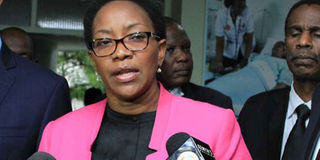Kenyans fail by not protecting patients from wayward medics

Health Cabinet Secretary Sicily Kariuki addresses journalists at Kenyatta National Hospital on March 2, 2018 regarding a botched surgery. PHOTO | JEFF ANGOTE | NATION MEDIA GROUP
What you need to know:
- Health ministry should propose a law to criminalise unnecessary operations, which some doctors perform for money.
- There is hope. Kenyan hospitals are as good as any in the world, when doctors are caring, committed and professional.
When a friend’s wife was admitted to Mater Hospital in Nairobi recently with a life-threatening condition, I was in a state of despair.
My faith in Kenyan medicine has been shaken over the years by the fact that nobody seems to care about the patient; doctors are never held to account for mistakes, carelessness, callousness and negligence, which often cost Kenyans their lives or maim them.
I also believe — and this is a personal belief — that not all persons practising medicine in Kenya are qualified to do so.
Sadly, Kenyan medicine is losing its nobility.
BRAIN SURGERY
It is becoming a cartel — just like the matatu saccos — dedicated to the enrichment and protection of doctors, clinics and hospitals at the expense of patients.
I suspect that even access to medical school is far from 100 per cent meritocratic; there is a tendency for the children of professors of medicine to have a head start in qualifying as doctors.
Maybe medicine runs in the family.
When doctors at Kenyatta National Hospital opened the skull of Mr John Nderitu and attempted to perform brain surgery on a patient who did not need it, Kenyans were outraged.
Yes, mistakes happen. But in situations where life is at risk, there should be evidence of a rigorous and caring process to make sure they don’t happen.
TEAMWORK
It is not clear if this is a hospital or some jua kali garage. Why is it that in Kenyan hospitals, a single doctor is allowed to operate on patients?
Why not follow the pattern of having teams of doctors treating a patient?
And why was the patient having brain surgery in the absence of the admitting/attending doctor?
Isn’t the team supposed to meet the patient and his family, reassure them and explain to them the course of treatment?
Mr Samuel Kimani, who is supposed to have had the surgery, didn’t need it after all.
He is, probably, a lucky man. Who knows whether he would have survived?
LILY KOROS
In the view of the Minister for Health, Ms Sicily Kariuki, it was important to hold to account the hospital’s CEO, Ms Lily Koros, to conduct an investigation and possibly change the way the facility is run.
But MPs were extremely upset with Ms Kariuki for daring to do that and they came close to impeaching her.
They blamed the hospital’s board of directors, which they have recommended be replaced.
The Health Committee’s report was amended to require that the taxpayer compensates Mr Kimani and Mr Nderitu.
In the view of MPs, neither the doctors nor the nurses were at fault and I am not aware of any recommendation to review procedures.
According to the Kenya Medical Practitioners and Dentists’ Board — the body which exists, it appears, to protect doctors from the consequences of their negligence — the medics were not at fault.
They followed procedure in performing brain surgery on the wrong patient. It was the nurses’ fault.
UNIONS
The National Nurses Association of Kenya would not take it lying down.
Their members were not going to be scapegoated for mistakes made by doctors.
They threatened that the issue would be “revisited” — echoing President Uhuru Kenyatta’s promise to re-look at the Supreme Court after it nullified his election.
In all that circus, no one was really speaking up for the patient or demanding that processes be looked at so that errors like those don’t recur.
Medical mistakes are not really confined to KNH or public hospitals.
PRECAUTION
I heard, and I have not confirmed, the case of a mother who recently went for a Caesarean section in a big private hospital and her bladder was cut.
The baby was discharged, but the mother is still in hospital, allegedly still not out of the woods after some four operations.
Now, yet another Kenyatta patient has complained that doctors have mucked up with her intestines during a C-section.
We all appreciate that there is risk involved in surgical procedures; no operation is 100 per cent safe.
Even the anaesthesia is known to kill a very small number of patients.
The question is: What measures are being taken to protect patients?
Who cries for these patients who are being butchered and killed in these institutions, some of which are clearly careless?
INFORMATION
The Health ministry should earn its keep and the doctors’ board should go jump in the lake.
First, it should impose surgical procedures to protect patients.
Second, it should propose a law to criminalise unnecessary operations, which some doctors perform for money.
Third, hospitals should be forced to disclose the number of patients who die during treatment and the circumstances of their deaths.
Patients have a right to know, before they go to theatre, if their surgeon is given to leaving patients dead on the operating table.
There should be transparency and accountability in hospitals.
There is hope. Kenyan hospitals are as good as any in the world, when doctors are caring, committed and professional.
My friend’s wife made a full recovery and was discharged.





